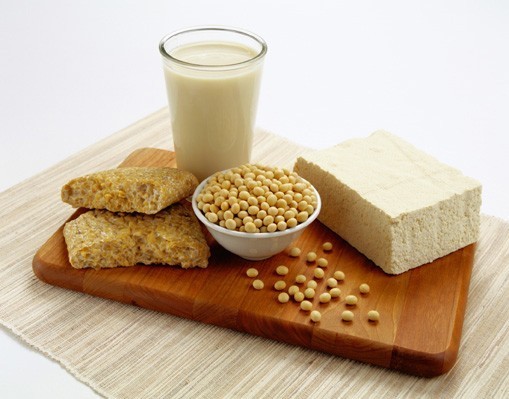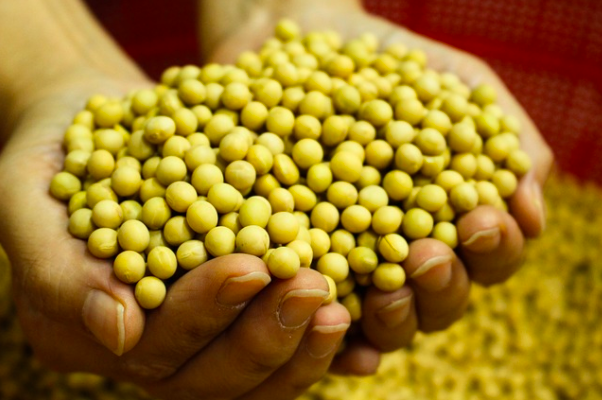Among the food myths that I am most often asked about, soy foods rate the highest on the list. Here are some of the most common myths about soy, and an update on what current research shows.

Myth: Soy’s isoflavones act like estrogen in the body, raising the risk of cancer
How we got it wrong:
Failure to understand the differences between estrogen and isoflavones (natural plant compounds found in soy foods) led to many false assumptions. Isoflavones have a similar chemical structure to human estrogen, but they bind to the body’s estrogen receptors differently and function differently.
Facts:
- Scientists have now found that rodents metabolize isoflavones differently than humans. So earlier studies in which soy isoflavones promoted the growth of estrogen receptor-positive (ER+) breast cancer in mice relate to much higher blood levels than what would result from humans consuming soy foods.
- Different kinds of estrogen receptors are present in different parts of the body. Activation of some receptors seems to promote cell growth. But studies suggest that isoflavones more often bind to estrogen receptors with other effects, potentially acting as a tumor suppressor.
- In studies of isolated cells, isoflavones can “turn on” genes that slow growth of cancer cells and stimulate their self-destruction (the process called “apoptosis”). These compounds may also support the body’s antioxidant defenses and DNA repair, which would help protect against cancer.
- Soy protein powder or soy isoflavone supplements show no effect on markers of breast cancer risk such as hormone levels, markers of breast cell growth, or breast density, in randomized controlled clinical trials. And likewise, such studies show no effect on prostate-specific antigen (PSA) levels or hormones related to the risk of prostate cancer.
- Population studies don’t link soy consumption with increased risk of any cancer, and limited evidence shows soy possibly protecting against lung cancer in people who have never smoked tobacco, and either no effect or decreased risk of prostate cancer. Observational studies also link moderate soy consumption (one to two servings a day) with lower breast cancer risk in Asia, where soy foods are commonly consumed throughout life.
- Emerging research links soy food consumption with a greater variety of health-promoting bacteria in the gut microbiome.
Myth: After a diagnosis of breast or prostate cancer, be sure to avoid soy foods
How we got it wrong:
Avoidance messages mainly stemmed from the misunderstanding about potential effects of “phytoestrogens” and hormone-sensitive cancers, and we didn’t have good data from research with cancer survivors. But now studies of survivors of breast and prostate cancer show no harmful effects, and potential for soy foods playing a beneficial role as part of a healthy diet.
Facts:
- Consistent findings from several population studies demonstrate that there is no increased risk for breast cancer survivors who consume soy foods. In fact, limited evidence shows potential for greater overall survival, and perhaps decreased recurrence, among women (including those who had ER+ cancer) who include moderate amounts of soy.
- Among men with prostate cancer preparing for or following prostate surgery, or following a “watchful waiting” approach after diagnosis, supplements of soy protein or isoflavones for periods ranging from 6 weeks to 2 years have shown either no effect or a decrease in progression of prostate cancer. Although benefit was unclear, none of these controlled clinical trials showed an increased risk associated with soy or isoflavone consumption.
- A link to overall survival may reflect a role for soy foods in eating habits to benefit heart health, which takes on added importance for many cancer survivors. Studies show a 4 to 6 percent drop in LDL cholesterol (particularly among people with elevated levels) and potential to reduce blood pressure in people with hypertension by promoting relaxation of blood vessels. These effects are linked with daily soy food consumption that are achievable, but well beyond occasional use.

Myth: Whole soybeans are ok, but any processing makes soy foods an unhealthy choice
How we got it wrong:
Some people fear that more processed soy foods concentrate isoflavones to dramatically high levels that could pose cancer risk. Others fear whether that processing removes all elements of soy that make it healthful. You can find soy ranging from minimally processed (like steamed edamame), to traditional soy foods that are moderately processed (think of tofu and soymilk) to isolated components used as ingredients (such as soy protein isolate in cereal and bars, and soy fiber added to bread).
Facts:
- Soy protein isolate powder and textured soy protein don’t contain any more isoflavones than an equal portion of plainly roasted soybeans. Some forms of isolated soy protein lose as much as 80 to 90 percent of isoflavones in processing.
- Moreover, these components of soy are not consumed on their own, but as an ingredient. As a result, isoflavone content of veggie burgers, bars and high-protein cereal with added soy protein ranges from dramatically less to a little less than in what is considered a standard serving of soy food (for example, a half-cup serving of tofu).
- To allow more precise control, clinical trials with soy have often used isolated soy protein or isoflavones. However, soy contains a variety of nutrients, phytochemicals and dietary fiber that may contribute to health. Although isolated isoflavone supplements sometimes provide amounts far beyond what has long been safely consumed in traditional Asian diets, this is not an issue when consuming up to three servings a day of even processed soy foods.
- On the other hand, don’t let a “health halo” lead you to think that adding soy protein to a low-nutrient, sugar-laden bar or drink turns it into health food. Isolated soy protein doesn’t provide the dietary fiber or complete range of nutrients found in common soy foods.
- Although isolated soy protein or fiber can contribute to a food and does not pose risk, neither turn a low-nutrient, sugar-or sodium-laden bar, drink or convenience food into a portion of health food. Several recent studies report connections between extensive use of ultra-processed foods and increased calorie consumption, weight gain, and possibly increased cancer risk. However, these studies group together a wide range of foods, including some that are far less healthful than others.
Bottom line
A range of soy foods are available to make plant-focused eating habits easy, delicious and nutritious. For now, there is no reason to steer clear of soy foods and let outdated myths about soy foods keep you from enjoying them as part of a healthy diet. There is also no reason to consider them must-haves if you prefer not to include them in your diet.






Great information! Thank you for making this information so clear!
I appreciate your thinking about this cautiously. It is important to be skeptical and check the source of information and the strength of evidence behind it. I don’t personally do research studies on soy or isoflavones, and no commercial company or soy-related organization supports the time I spend searching for and studying published research on this topic. Whether considering soy consumption or other choices about eating, my advice is to never make decisions based on a single study. Scientists consider the strongest evidence to come when all available research is evaluated for quality, adjusted for other potential influences (like family history or physical activity), and best quality evidence is analyzed as a whole. This is the way that the analysis of soy and breast cancer and breast cancer survivors were conducted in the AICR Expert Report, so I trust that much more than any single study. One point to remember: these results that I share talk about soy foods in moderation as a reasonable choice. It’s important to include other sources of protein, too, whether a vegan diet or not.
Thankyou so much this information was very helpful 🙂
You have given me great news regarding soy…..I have a son whom gets aggravated when I purchase foods with soy, says its not good for the male!!!! And I like soysauce even though it may seem salty. Thank You again for posting this info.
Hi Diane, there are so many delicious soy foods to make plant-focused eating habits easy and fun! You can certainly add flavor to recipes by using soy sauce but I encourage you to choose low or reduced sodium varieties. Our Spring Salad with Tofu Croutons is a delicious recipe I encourage you to check out.
Love to read this article on Soy and cancer myths. Thank you so much for sharing this post with us, It gives me some great information that I was looking for!!!
Wish I could find consistent information as to whether or not soy products are good or bad for prostate cancer. Too many conflicting articles.
Karen: It is such pleasure to read your writing. You get right to the point and explain the point clearly. I love the “How we got it wrong” sections. As someone recently diagnosed with prostate cancer, I appreciate the clarity of your writing.
Thanks , you do clear a lot of myths. I do wonder how is that people in Okinawa, who consume o much Tofu live more than 100 years. I think it has more do with reduced stress and community living than just tofu as a staple part of their diet.